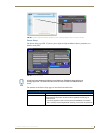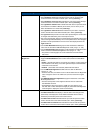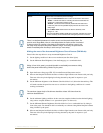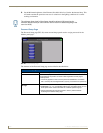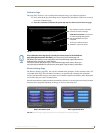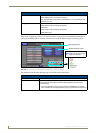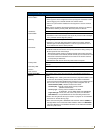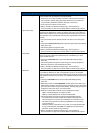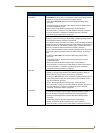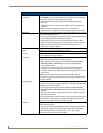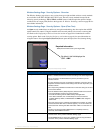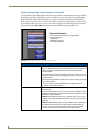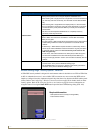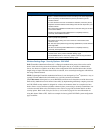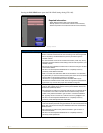
Firmware Pages and Descriptions
113
7" Modero Widescreen Touch Panels
Wireless Settings Page Elements (Cont.)
Wireless Security (Cont.):
EAP-PEAP An EAP-PEAP security method is designed for wireless environments where its
necessary to securely transmit data over a wireless network.
• Pressing the EAP-PEAP button opens the EAP-PEAP Settings dialog
(FIG. 109).
• The following fields are required: SSID, Identity, Password, PEAP Version,
and Inner Authentication Type
• Refer to the following Wireless Settings Page - Security Options -
Overview section on page 115 for further details on these security options.
• For more information on uploading a certificate file, refer to the AMX
Certificate Upload Utility section on page 207.
EAP-TTLS An EAP-TTLS security method is designed for wireless environments where its
necessary to first have the Radius server directly validate the identity of the cli-
ent (panel) before allowing it access to the network.
This validation is done by tunneling a connection through the WAP and directly
between the panel and the Radius server. By initially keeping the network out of
the picture, there is far more security validation going on behind the scenes
before any possible access to the network is granted to the client.
Once the client is identified and then validated, the Radius server disconnects
the tunnel and allows the panel to access the network directly via the target
WAP.
• Pressing the EAP-TTLS button opens the EAP-TTLS Settings dialog
(FIG. 110).
• The following fields are required: SSID, Identity, Password, and Inner
Authentication Type
• Refer to the following Wireless Settings Page - Security Options -
Overview section on page 115 for further details on these security options.
• For more information on uploading a certificate file, refer to the AMX
Certificate Upload Utility section on page 207.
EAP-TLS An EAP-TLS security method is designed for wireless environments where its
necessary to securely transmit data over a wireless network by adding an
additional level of security protocol via the use of a private key.
• Pressing the EAP-TLS button opens the EAP-TLS Settings dialog (FIG. 111).
• The following fields are required: SSID, Identity, Client Certificate, Private
Key, and Private Key password
• Refer to the following Wireless Settings Page - Security Options -
Overview section on page 115 for further details on these security options.
• For more information on uploading a certificate file, refer to the AMX
Certificate Upload Utility section on page 207.
EAP-LEAP An EAP-LEAP security method is designed for wireless environments where its
not required to have both a client or server certificate validation scheme in
place yet necessary to securely transmit data over a wireless network.
• Pressing the EAP-LEAP button opens the EAP-LEAP Settings dialog
(FIG. 105).
• The following fields are required: SSID, Identity, and Password
• Refer to the following Wireless Settings Page - Security Options -
Overview section on page 115 for further details on these security options.



